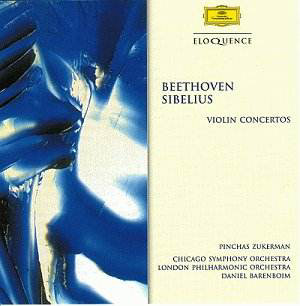Both these concertos are amongst the most popular in
the repertoire, and are also amongst the most frequently recorded. But,
perhaps surprisingly, discs of them coupled together are relatively
rare, so this inexpensive re-issue is very welcome, particularly given
the extremely persuasive performances and generous playing time.
Zukerman had recorded the Beethoven previously, with
Mehta and the Los Angeles Philharmonic (not a version I know), but this
1977 recording has long been a mainstay of lower-priced recommendations.
Itís easy to see why. This is a typically muscular, big-boned performance,
with the soloist producing a seamless flow of rich, full tone. He is
matched perfectly by Barenboimís accompaniment, which similarly treats
the work as the first great Romantic violin concerto. The opening of
the piece gives a good idea of the general approach; the wonderfully
hushed timpani strokes are steady and mysterious, creating an atmosphere
out of which the first subject can then float ethereally. At the first
big tutti, Barenboim encourages the orchestra to play in long, arched
phrases that remind one of Fürtwängler (one of Barenboimís
avowed influences), and throughout the performance one is made aware
of architecture as much as detail. The sublime second subject is beautifully
phrased by the Chicago oboist, and the sheer scope of this massive (25
minute) first movement is altogether effectively realized. The slow
movement suits Zukerman and Barenboimís approach perfectly, and the
sonorous beauty of the violin tone is well matched by the orchestral
support. The rondo finale, one of Beethovenís finest inspirations, might
gain something with a bit more bounce and rhythmic vitality (as Hilary
Hahn gives it in her highly recommendable version on Sony), but nevertheless,
the sheer weight of tone and quality of the playing easily compensate.
The Sibelius is, if anything, even finer. The dolce
ed espressivo opening is wonderfully phrased, with the rocking quaver
figuration on strings creating a real backdrop of awe and mystery. Tempo
is crucial in Sibelius, and Barenboimís steady speed pays real dividends;
being able to think in long, arched paragraphs makes more sense of the
composerís harmonic scheme, and when the Allegro molto breaks
in (around 5.41) there is a real exhilaration that is all the more effective.
Zukermanís handling of the cadenza (7.43) is exemplary, with Barenboim
keeping the long B flat pedal suitably hushed. The slow movement highlights
the excellent playing of the LPOís wind section, the opening clarinet
and oboe thirds marvellously phrased. The big climax (6.25) has a massive,
granite quality that is very moving. The finale has the violinist tearing
into his energico solo line like a man possessed, and again the
huge orchestral tuttis are very imposing in Barenboimís hands.
As you may have guessed, I loved this disc. Though
he has his detractors, Barenboim has done many fine things as a conductor,
and I have not heard any better modern version of either piece. You
will undoubtedly get different sorts of insights from different players,
but Zukerman gives as intelligent and musical a performance of both
these great concertos as we have a right to expect. Recordings are top-drawer,
with a weight and amplitude that suits the interpretations to perfection.
The liner notes are paltry, which is a pity, as most of these cheap
re-issues are surely aimed at new collectors who need plenty of information.
Still, the musicís the thing, so if you fancy this coupling, donít hesitate.
Tony Haywood


